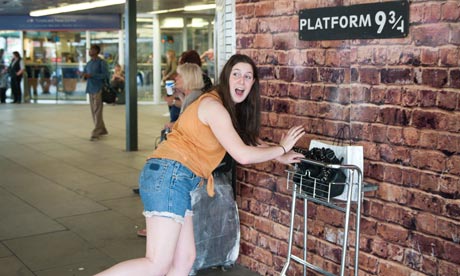
In a few weeks' time, there's going to be a ceremony in Poets' Corner, Westminster Abbey, to consecrate a shrine to the memory of Ted Hughes. This is the fast track up Parnassus. Christopher Marlowe had to wait four centuries to get his name on an abbey window.
Hughes will join Chaucer, Shelley and Tennyson. There are some pretty weird birds roosting in this part of Westminster, a fraternity that includes forgotten figures such as Thomas Shadwell, Granville Sharp and Charles Sorley. He will also be near some prose masters, from Henry James to Winston Churchill.
A plaque, or a monument, is all very well, but great literature inspires more than piety. There's an inevitable curiosity about the writer's quotidian circumstances. Hughes's admirers will also want to visit his childhood home in Mytholmroyd. Bardophiles will go to Stratford, and Austenites to Chawton House. Haworth parsonage is indispensable for Brontë fans. Readers want to see where, and how, their favourite writers lived, see what they saw and look outwards from their desks.
This kind of voyeurism is perhaps slightly embarrassing, but addictive. Years ago, during some filming with the BBC, I found myself alone and unsupervised in Melrose, Walter Scott's Borders home, custom-built with the profits from the Waverley novels. In the cluttered, gloomy study, his specially designed writing chair seemed particularly inviting. No one was about, so I sat in it for a few minutes hoping to channel the Scott vibe. This is sad, but true.
Literary tourism is not what it was. When Thomas Jefferson and John Adams visited Shakespeare's birthplace in Henley Street, they admired the chair in the corner where (they were told) the Bard himself would have sat. The American visitors were encouraged to help themselves to souvenir chips of wood from this immortal seat and Jefferson paid a shilling to see the poet's grave.
In London, the sites of famous literary deaths continue to attract groupies, from Sylvia Plath's last address, 23 Fitzroy Road, to the Islington flat in which Joe Orton was bludgeoned to death by his lover Kenneth Halliwell in 1967. More elevated, but almost as poignant, is Keats's house in Hampstead.
Another of my favourites, Samuel Johnson's house in Gough Square, just off Fleet Street, is an ideal shrine, the world HQ of the English dictionary business. Here, you can see where the good doctor sat, understand the conditions in which he worked and savour the lingering atmosphere of Georgian London. No doubt there are similar thrills to be had from a visit to Roald Dahl's now infamous shed.
Most of these places are the work of literary estates or fan clubs. There are, however, some locations that transcend piety, where fact and fiction blur into the unpoliced landscape of the imagination. At 221b Baker Street, just north of the tube, Sherlock Holmes addicts can participate in the illusion that they have stepped back in time to late Victorian London, and into the pages of his mysteries. This is eccentric, but not unique. Twenty-first-century readers have their own Conan Doyle equivalent.
King's Cross is just down the road from the Observer's offices. As you leave the station, there's often a line of people on the pavement queueing to have their picture taken holding the handle of a baggage trolley embedded in a wall, under a sign that reads Platform 9¾. These are Pottermanes, acting out the young wizard's leap of faith into the magical world of Hogwarts.
And here's the remarkable thing: these pilgrims are not just English school kids. Many are teenagers, most are foreign, and some of those queuing are mature adults with no children in tow. The other odd thing about this display of fandom is that this is now the third resting place of the Harry Potter trolley. Originally, it was close to platform 9. But the queues became so great, the station authorities had to move the sign to a purpose-built alcove, less disruptive to travellers from the north.
Ms Rowling, meanwhile, lives behind gates in Kensington or Scotland. Dead writers get memorials. Living writers need privacy.
A Greek tragedy is a blessing for some
"I'm not chick lit," declared Victoria Hislop launching her remarkable new novel The Thread (Headline) in front of many friends at the Hellenic Centre in London. Far from it. Ever since the 2005 publication of The Island ("Beach-reading with a heart," said the Observer), Hislop has become first a UK and then a Greek bestselling phenomenon. She joins Lord Byron and Patrick Leigh Fermor in Grecian hearts, and The Thread puts the contemporary troubles of Greece in historical perspective. "The Greeks may go down," she said, "but they always come back." Right now, the Hislop oeuvre, and its numerous Hellenic spin-offs, which include a multi-part television series, must be one of the few signs of hope in a bleak economic landscape.
It's not all terminal for the airport novel
Ever since Alain de Botton spent a week at terminal 5 in 2009 and described his adventures in A Heathrow Diary, the world has been waiting for BAA to grasp the broader literary possibilities of the world's fourth busiest airport. Contemporary fiction finally achieved take-off with the publication of Departures, the novel Tony Parsons wrote during his appointment as writer-in-residence at Heathrow. The big cliffhanger? Which passengers or staff would make a walk-on appearance in the pages of the new book? It's not exactly the Reichenbach Falls, but the new genre will no doubt take wing eventually. As well as handing out 5,000 copies to the public, the Heathrow authorities also sponsored a live reading from the book and publicised it on Facebook.

